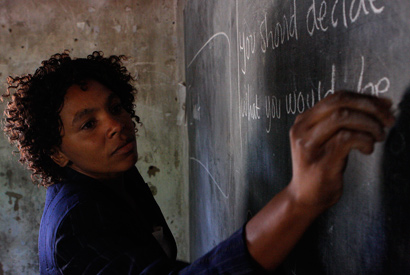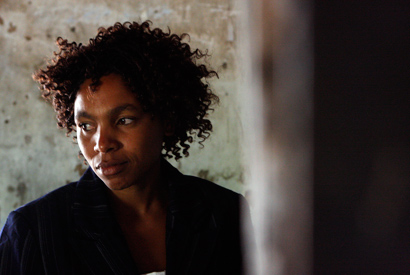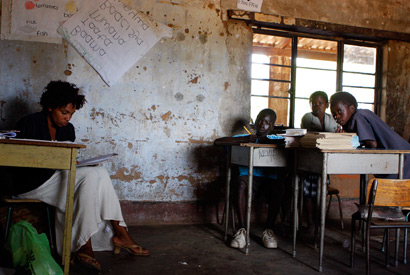
Sonia Haloba Shanegubo aims to inspire her pupils to break out of the cycle of poverty.
Sonia Haloba Shanegubo is the only teacher currently at Simakakata Community School other than headmaster George who is paid a salary by the government. A third is currently on maternity leave, but there’s no replacement during her absence.
Many government trained teachers won’t take jobs in rural schools with no housing or amenities: Sonia is here because she believes a quality education is the only thing that will rescue the children of Simakakata from a cycle of poverty and dependence. The commitment and determination she has shown to get where she is is daunting.
Sonia teaches the grade 3 class in the morning, and grade 1 in the afternoon. She is young, quiet and smartly dressed. Amazingly, her white skirt doesn’t show a single speck of dust from her commute this morning: even though she has to walk 7km along the main road between here and her house in Kalomo twice a day.
She has two children, four year old Ed and 16 month old Endy, who is still breastfeeding.
“As long as the school is in operation, I will be here,” she says, “I want to teach the children so that in the future they can be like me, and do something different. Something that will help communities like Simakakata.
“The most important thing we can do to help the children here is help them go to school. There are children here whose heads are full of knowledge, but there is no-one to push them and help them get ahead. So they just go hunting, do whatever, end up begging in Kalomo.
“I want them to have a better future and not end up as street kids.”

Many days Sonia teaches grades 1 and 2 together as attendance levels are hard to predict.
The teachers here understand exactly the problems and challenges their children and their families face when it comes to education.
“I grew up just here in Kalomo,” Sonia says, “With one single parent, my mother. We lived with my grandmother. There are six children in my family, and I am the first born.”
Sonia’s mother died in 1999, when Sonia was 18. Her youngest sister was barely a year old. Sonia’s boyfriend, Edwin Mwenda, paid Sonia’s tuition fees so that she could go back to high school and graduate. They married in 2002, and in 2003 Sonia went to Livingstone to train as a teacher. There’s no government support for teacher training here: the family was reliant on Edwin’s income as a lorry driver to support her brothers and sisters, as well as pay her college fees.
After her training, Sonia volunteered to teach at a Community School in Mazabuka district. It was an even more remote setting than Simakakata. The nearest tarmaced road was 15km away. Many teachers here work at their first post for free, while waiting for the government to ‘deploy’ them. The wait can be up to three years.

The current school is far from ideal, but there
Sonia stayed at her school after deployment, but moved to another community near Kalomo after her grandmother died.
“I wanted to push my brothers and sisters so they would go to college,” Sonia says, “So I decided to sponsor my sister at college. I used money we earned buying goods like DVDs and music cassettes in Botswana to sell here to pay for her schools fees. My husband has to drive there often.
“Once my sister was trained as a teacher and deployed, she wanted to educate our younger sisters and brothers. So my sister sponsors one, my oldest brother sponsors one and I sponsor two through school.
“We now have enough that my second youngest brother, who is working in a shop in town, can go to college next year.”
Sonia knows that Simakakata Community school needs help from outside the community to get it established, but believes that the whole project will be self reliant once it’s completed.
“The most important thing we have to do is push those children in the community who are failing to go to school, to get them back to school. Encourage them to do something other than stay in the fields all day. We can help the parents too, those who need to go back to school to learn to read and write can.
“We should teach the parents projects like sewing, making baskets, beancraft that they can sell to find money to help children to go skills.”
Sonia is self-effacing and quiet when talking about her own story and incredible achievements. But when she talks about the need for education in Zambia, she is fast, loud and enthusiastic.
“I have seen a lot of people with a lot of difficulties in life. You can have the courage to want to go to school, but if there’s no one to help… I pity such people.”
The government will only send teachers to schools if there is accommodation for them.
A small house for teachers’ accommodation costs just £6,500 and will help Simakakata attract more exceptional people like Sonia to work at the school. If you’d like to donate, click here.







1 comment
Leave a comment >
I am moved by the initiative that this charity has started and I should mention that there are thousands of teachers who are like Sonia in Zambia. They have the heart for children but due to many hiccups such as lack of accomodation and many other hurdles associated with rural areas in Zambia, they are unable to get to rural schools leaving thousands of children stranded without any one to teach them.
I support this move and urge those with the resources to help.